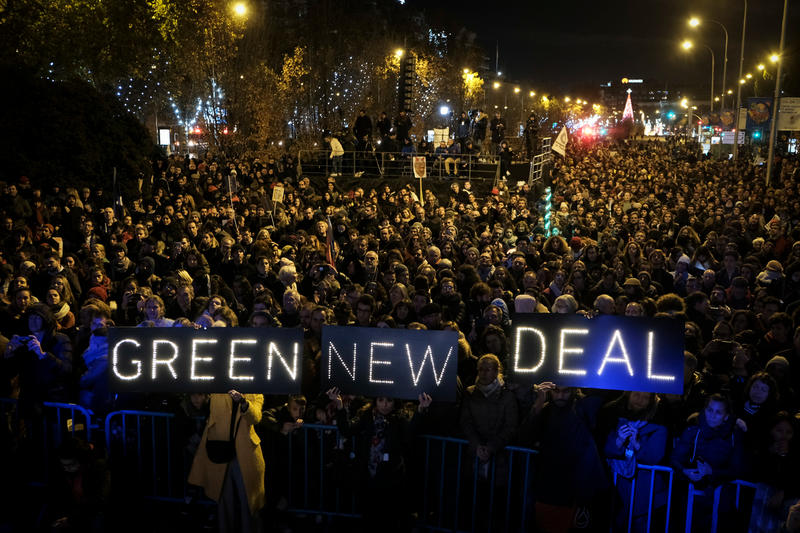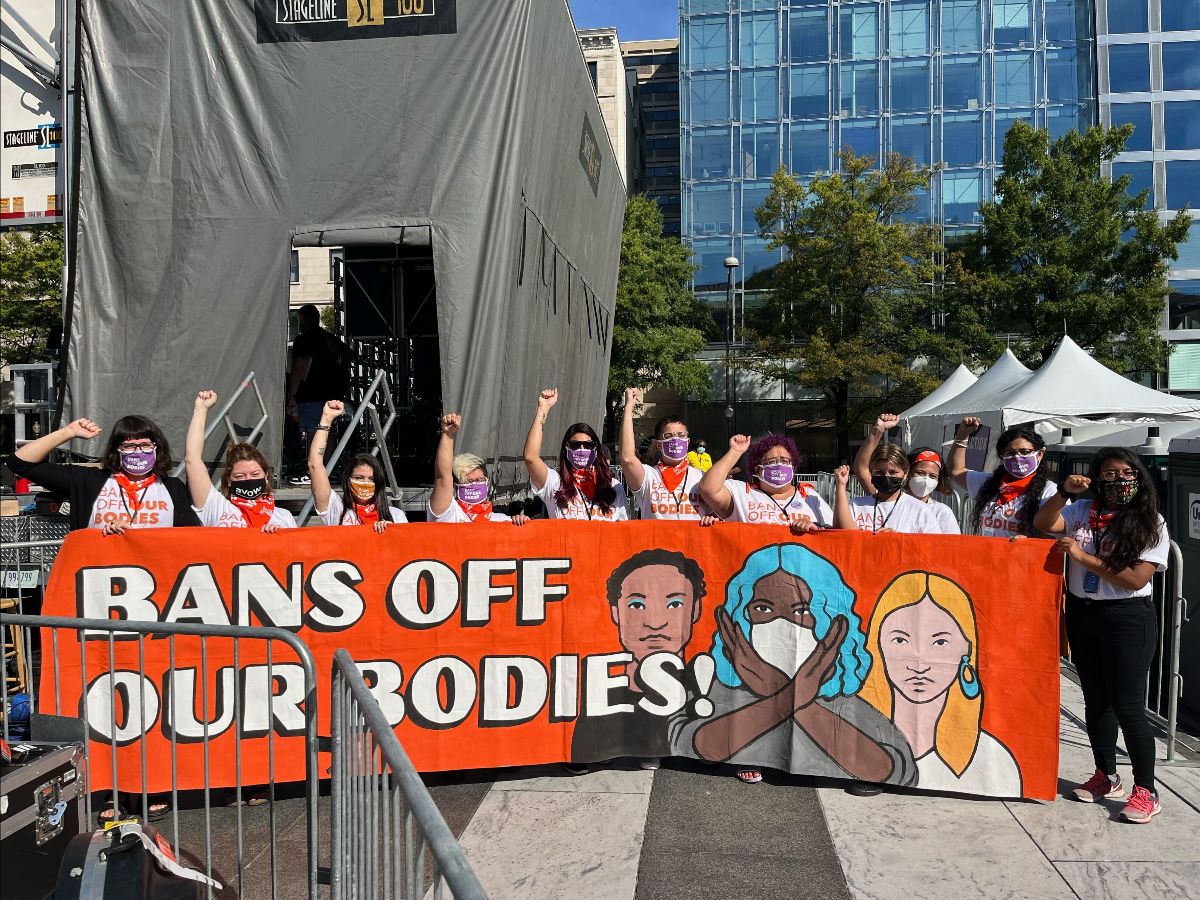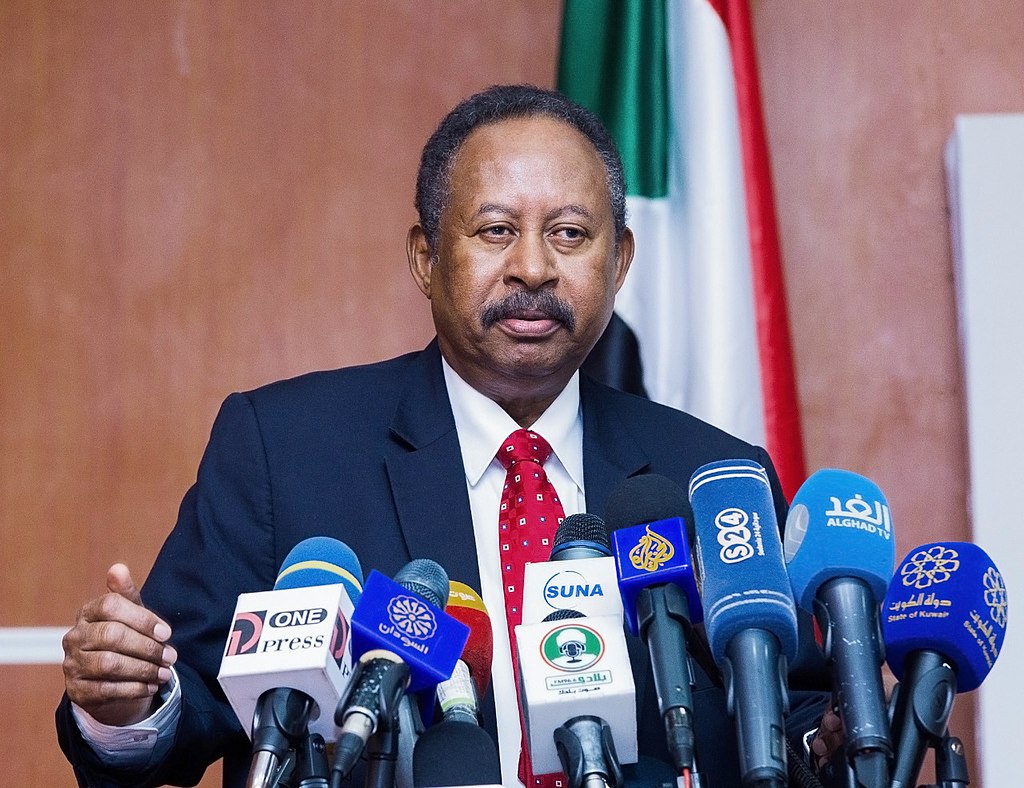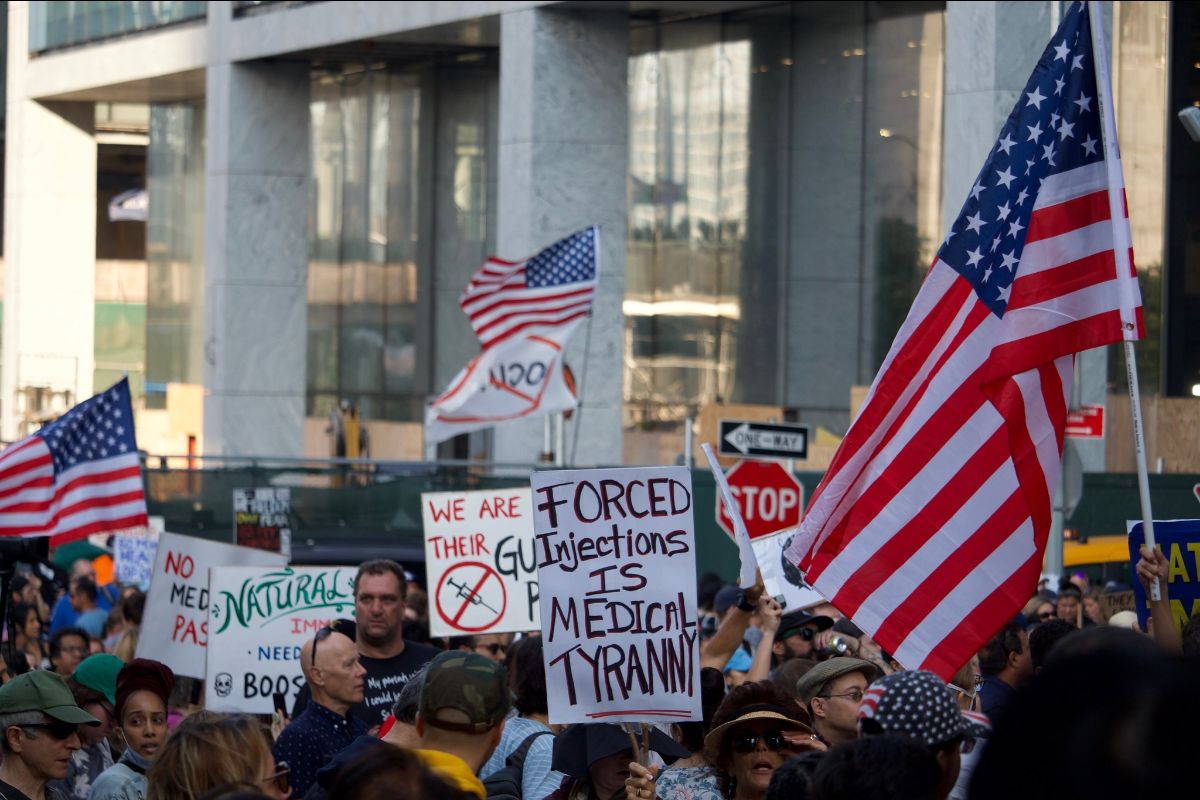Top photo: Protesters marched to Hudson Yards in New York City on Oct. 16, 2021, to protest the city’s vaccine mandates for municipal and healthcare workers. (Photo: Pamela Drew / Flickr)
A look ahead:
Oct. 29/ New York City vaccine mandate: New York City municipal employees are required to provide proof of at least one coronavirus vaccine dose by Friday or be placed on unpaid leave, according to a mandate announced last week by Mayor Bill de Blasio that has drawn protests across the city.
- What’s happened so far: The mandate will immediately apply to around 160,500 city workers — which includes employees of the police, fire, sanitation and corrections departments — and seeks to boost lagging numbers in those agencies. City employees will also receive an extra $500 in their paycheck for getting jabs at a city-run vaccination site. The city’s largest police union on Monday asked a judge to allow unvaccinated officers to continue working, arguing that the requirement did not contain sufficient protections for religious exemptions. That same day, a large crowd that included many fire, police and sanitation workers marched across the Brooklyn Bridge to City Hall in protest of the mandate.
- The impact: While the hope is for the mandate to push people to get vaccinated, it could seriously affect the city’s capacity if it doesn’t. Several of the key agencies have around 60 to 70 percent vaccination rate and are already dealing with staffing issues that could be exacerbated if many employees are placed on unpaid leave. De Blasio, however, predicts these employees will receive the shots to continue working, citing the thousands who were vaccinated days before the deadline for public school and healthcare workers in September.
Oct. 30/ Russia workplace shutdown: In response to soaring coronavirus death tolls, Russian President Putin declared a week of “non-working days” starting Friday as part of a series of new, stricter restrictions introduced to combat the spike.
- What’s happened so far: Russia has repeatedly hit record highs for coronavirus deaths the last few months and now ranks fifth in the world in total fatalities since the start of the pandemic. In an effort to curb the spike, Moscow, the epicenter of the country’s clusters, will shut down all businesses aside from supermarkets and pharmacies during the period. While Putin’s decree states all employee salaries “should be” paid, placing pressure on many businesses already crippling from the pandemic, the government only pledged support for small and medium-sized businesses, for an amount equal to the minimum wage.
- The Impact: Russia’s struggle through a particularly bad phase of the pandemic does not appear close to an end. Despite it being one of the world’s first countries to launch a booster shot campaign in July, the country reports sluggish vaccination rates with just 34.9 percent of the country’s population fully vaccinated. So far, the Kremlin has ruled out another nationwide lockdown, but surging infections are expected to continue putting pressure on Russia’s healthcare system.
Oct. 30/ G20 summit in Rome: Starting Saturday, Rome is set to host this year’s G20 summit, which will likely focus on issues like the environment, inequality and coronavirus.
- What’s happened so far: At the 16th summit of the world’s biggest economies, world leaders are expected to discuss global recovery measures 18 months after the coronavirus outbreak, actions to reduce inequality while generating economic growth and, most likely, set the agenda for the COP26 global climate talks that will take place immediately after in Glasgow. Although this will be the first in-person G20 meeting since 2019, some world leaders announced they will not attend the event. Russia, Japan and Mexico confirmed its heads of government and state will follow the event virtually and China’s attendance remains doubtful.
- The impact: Two topics likely be center-stage in the discussions are limiting global warming and the staged elimination of the coal industry. G20 countries will seek to reach consensus ahead of the U.N. climate summit as the main world producers of carbon emissions amid the traditional divide between the blocks of developed and developing nations.

Oct. 31/ U.N. climate summit: Some 120 world leaders will meet for a week beginning Sunday in Glasgow at the annual U.N. climate conference to discuss plans to cut or curb greenhouse gas emissions.
- What’s happened so far: Though Britain holds the presidency for this year’s summit, which was delayed a year due to the pandemic, Queen Elizabeth II announced this week that she would not attend on the advice of her doctors. Under the 2015 Paris Agreement, nations committed to keeping temperature levels “well below” two degrees Celsius above pre-industrial levels, but current national pledges do not suffice to keep the world’s temperature below that mark. Some leaders, including Russian President Vladimir Putin, said they will not attend the summit and others, like Chinese President Xi Jinping, have not yet confirmed.
- The Impact: As part of the 2015 agreement, negotiators built in a “ratchet mechanism” that aims to ensure countries return to the table every five years with a ramped-up set of targets. Among other things, British Prime Minister Boris Johnson wants to secure a commitment from all countries attending the summit that they will reach net-zero carbon emissions by the middle of this century.
Oct. 31/ Japan general election: Japan’s House of Representatives will hold general elections on Sunday, with every seat in the lower parliamentary house up for grabs for the first time in the Reiwa era.
- What’s happened so far: Japan’s Liberal Democratic Party, which has ruled the country for all but four of the past 66 years, elected new leader Fumio Kishida in late September. Kishida was then voted in as prime minister, only to dissolve the House of Representatives a few weeks later due to a fast-approaching constitutional deadline for general elections. The ruling party suffered a setback by losing a seat in the upper house in special by-elections last week.
- The impact: The Liberal Democratic Party is unlikely to completely lose control of the House of Representatives, especially with the support of its coalition partner Komeito, but polling finds their outright majority may be at risk. With the typically fractured coalition parties now cooperating to seize lower House seats, any major loss for the ruling party will hamper the new Kishida government.
Nov. 1/ Brazil trucker strike: Truck drivers across several Brazilian states plan to strike Monday over the increase in fuel prices and new government’s proposals for the sector.
- What’s happened so far: Drivers have held blockages over the past month in protest of raising fuel prices and Petrobras’ pricing policy, cutting access to several fuel distribution centers and leading to shortages. President Jair Bolsonaro announced this month a “diesel aid” for around 750,000 truck drivers by the end of 2022, but drivers rejected the offer, calling it “insufficient.” Just days before the planned strike, the federal government canceled a last-minute meeting with drivers where officials were expected to reach agreements to avoid the mobilization.
- The impact: The strike is expected to last up to two weeks with action mobilized mainly in the Port of Santos in São Paulo, but likely to spread across other states. Engineering Institute officials warned the country is “facing a very chaotic situation,” not only with fuel prices but with the quality of roads, in a country heavily dependent on trucks to deliver goods and services. A large number of drivers are expected to join the strike, particularly after the government failed to meet with their representatives, which could lead to more fuel shortages as well as political unrest in a deeply divided country.

Nov. 1/ Supreme Court hears Texas abortion ban arguments: The U.S. Supreme Court will hear arguments starting Monday concerning Texas’ highly restrictive abortion law that bans the procedure after roughly six weeks of pregnancy and enables lawsuits against abortion providers.
- What’s happened so far: The controversial law passed exclusively by Republican legislators was designed specifically to survive attempts to dismantle it in the court system by turning the enforcement mechanism over to private citizens through a lawsuit stipulation. The Supreme Court allowed the bill to take effect on Sept. 1 in a narrow 5-4 vote with Chief Justice Roberts dissenting and is now set to take up a challenge from abortion providers and a Justice Department petition — the first of its kind challenging a state abortion restriction.
- The impact: It remains unclear if the court will address the core question of the law: whether the landmark Roe v. Wade ruling remains precedent. Nonetheless, the Supreme Court’s ruling could potentially pave the way for widespread erosion of the constitutional right to an abortion without excessive government restriction, with other Republican-led states surely to follow Texas.
Nov. 1/ South African local government elections: South Africa’s ruling African National Congress (ANC) will face a significant test Monday as voters elect new mayors and city councillors across the country in municipal elections, held every five years.
- What’s happened so far: More than 300 parties are fielding candidates as South Africa continues to grapple with fallout from the pandemic — including record-high unemployment — as well as an ongoing corruption case against former President Jacob Zuma. Though the economy saw growth in the second quarter, third quarter figures are expected to lag due to both a severe third wave of coronavirus infections and July riots following Zuma’s arrest that saw nearly 350 people killed. Concerns also remain about a potential fourth wave of the virus by the end of the year, with only 30 percent of adults fully vaccinated.
- The impact: A rebuke by voters of the ANC could suggest a looming shakeup of the country’s political landscape ahead of the 2024 general election. Recent polling shows the party garnering nearly half the vote, a showing that could lead to changes in leadership during their next national conference in 2022. The electoral commission expects to announce the results by Thursday.
Nov. 1/ U.N. Human Rights report on Ethiopia: A U.N. report due to be released on Monday is expected to reveal numerous allegations of human rights violations during the year-long conflict in in Tigray, Ethiopia.
- What’s happened so far: Investigators from the U.N. human rights office carried out more than 200 interviews with eyewitnesses, authorities and humanitarian actors during a three-month inquiry over the summer of 2021. After fieldwork across Tigray was completed, U.N. High Commissioner for Human Rights Michelle Bachelet indicated the report would contain allegations of attacks on civilians, extrajudicial killings, torture, enforced disappearances and sexual violence. Meanwhile, the humanitarian situation continues to worsen in Tigray, with more than 5.2 million people in need of aid. A U.N. humanitarian flight on Oct. 22 was forced to return to Addis Ababa due to airstrikes in the Tigrayan capital Mekele.
- The impact: Bachelet has urged the Ethiopian government to heed the recommendations of the U.N. investigation and to give humanitarian actors unhindered access to Tigray. The EU said it was awaiting Monday’s report to inform sanctions it plans to impose on those involved. In the United States, the Biden administration said it is prepared to impose sanctions on the Ethiopian government and any other parties accused of prolonging the war. Human Rights Watch called on Bachelet to hold an inter-sessional briefing on the situation before the end of 2021.
Nov. 3/ Nordic Council summit in Copenhagen: Members of the Nordic Council will gather in Copenhagen on Monday for the 73rd session of the four-day Nordic Council Summit.
- What’s happened so far: While the summit was held digitally last year due to the coronavirus pandemic, prime ministers from all member states are expected to attend in-person this year. The summit is focused around coronavirus, specifically what the Nordic Region can learn from the crisis and how to strengthen cooperation in the future. NATO Secretary General Jens Stoltenberg is expected to attend as the international guest speaker. The Nordic Council has prepared a list of proposals for the prime ministers in attendance for better crisis coordination, including a new Nordic agreement on emergency preparedness cooperation which will culminate in a uniform or joint crisis preparedness law.
- The impact: The summit’s topic on coronavirus and crisis-preparedness aims to address the concerns of the citizens of Denmark, Finland, Iceland, Norway, Sweden, the Farce Islands, Greenland and the Aland Islands. A recent report by the Nordic Council shows that people of the region have positive attitudes toward cooperation between member states, but a huge number of them were disappointed with the lack of a region-wide coronavirus strategy.

What else matters:
Sudan coup: Sudan’s military broke up a fragile two-year-old governance partnership with civilians this month, seizing power in what marked the fifth coup in the northern part of the continent over the past 15 months. Coup leader Gen. Abdel-Fattah Burhan said he took the step to save the country from “civil war,” a claim that hasn’t stopped thousands of protesters from taking to the streets, leading to deadly clashes with security forces.
- Watch for: The coup came just weeks before Burhan was due to hand over leadership of the nation’s executive Sovereign Council to a civilian as part of a 2019 agreement to transition Sudan to elections following the ouster of President Omar al-Bashir. Despite swift international condemnation, specifically from the West and the United Nations, Burhan shows no sign of backing down. The United States suspended $700 million in aid to Sudan and said it’s in close contact with Persian Gulf allies to lobby for a return to “a democratic path,” though the most influential of those nations — United Arab Emirates and Saudi Arabia — supported Egypt’s coup in 2013 and the Tunisian president’s seizure of power in July. Burhan said Tuesday he’ll announce a new government and constitutional court as early as this week.
Supply chain issues: Disruptions to the global supply change have worsened in recent weeks as the coronavirus pandemic continues to wreak havoc. In early 2020, many shipping companies slowed down, assuming there would be less demand for products around the world. In actuality, people in quarantine increased their demand, especially for office products, in-home gym equipment and cooking supplies. The situation was worsened by companies using money to maximize profitability rather than store excess products. Since then, shortages have deepened and the supply chain has not been able to catch up.
- Watch for: Demand for holiday products is exacerbating the situation and leading to increased prices. Many experts are already calling Thanksgiving 2021 the most expensive meal in its history. The situation could last another year with U.S. Treasury Secretary Janet Yellen saying she expects improvement by the second half of 2022. If things continue to get worse, President Joe Biden says he’s considering deploying the National Guard to help.
Extended outlook: What’s on our radar in the coming weeks
Oct. 28: Volvo IPO
Oct. 29: NYC vaccine mandate goes into effect for all city employees; Biden and Macron to meet in Rome; Biden meets Pope Francis in Rome
Oct. 30: G20 summit in Rome; Russia begins week-long workplace shutdown
Oct. 31: Planned launch of James Webb Space Telescope; Japan general election; UN Climate Change Conference
Nov. 1: U.S. to allow fully vaccinated travelers from Canada and Mexico; South Africa local government elections; Brazil trucker strike; U.S. Supreme Court to hear arguments against Texas abortion ban; UN Human Rights Council releases report into abuses in Tigray, Ethiopia
Nov. 2: Virginia and New Jersey gubernatorial and Ohio congressional special elections; New York City mayoral election
Nov. 3: Nordic Council summit in Copenhagen, Denmark
Nov. 5: China International Import Expo in Shanghai; Colin Powell’s memorial service
Nov. 7: Nicaraguan general election; Daylight saving time ends in most of Canada and the U.S.
Nov. 8: China’s Communist Party holds sixth plenum
Nov. 14: Bulgaria presidential election; Argentine legislative elections
Nov. 17: Gulf of Mexico oil and gas auction
Nov. 20: 89th General Assembly of Interpol in Istanbul
Nov. 21: Chilean general election to elect a new president and National Congress
Nov. 22: Deadline for U.S. federal employees to be fully vaccinated
Nov. 28: Honduran general election

